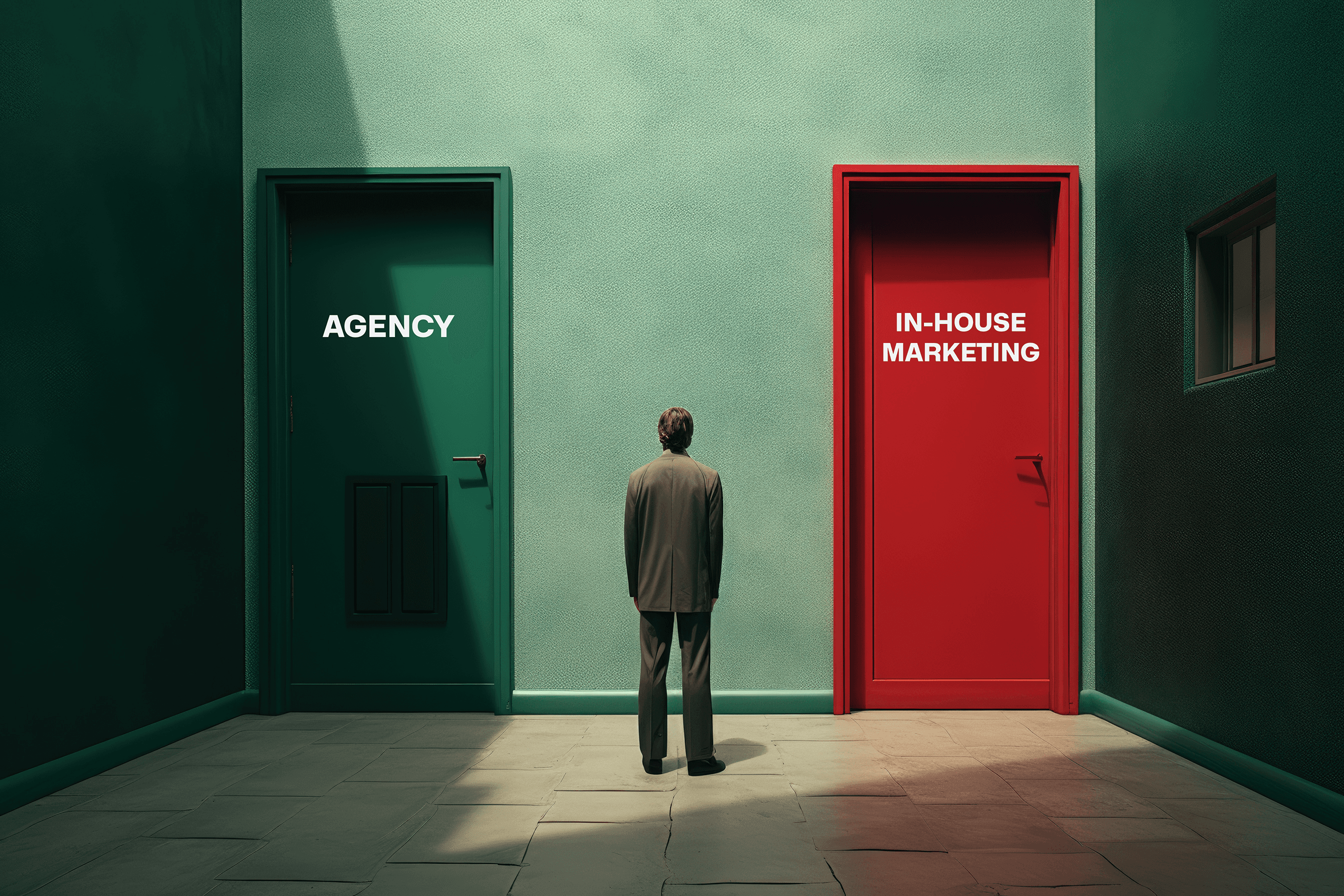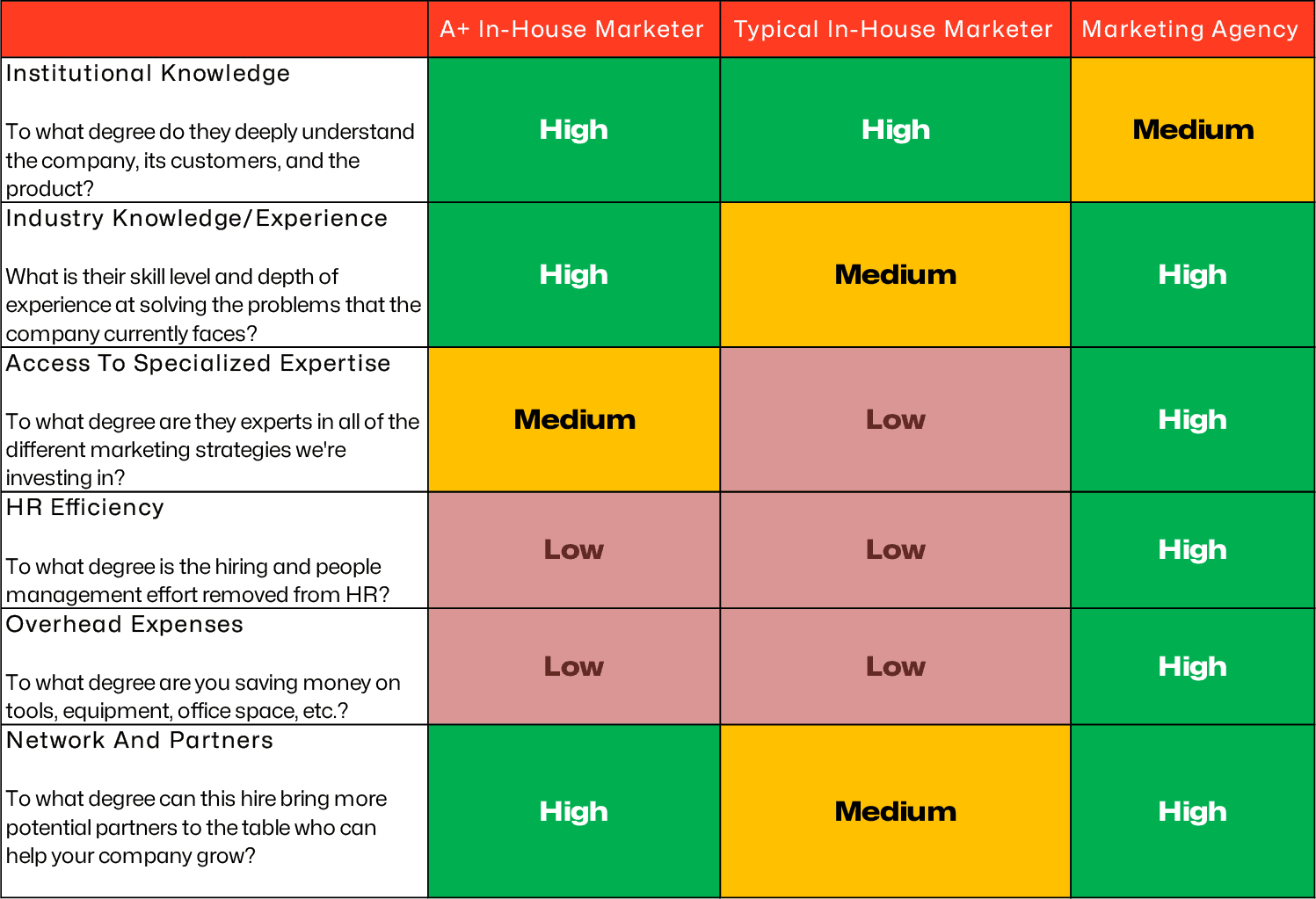Agency vs. In-House Marketing: What's Right for Your Business?
Agency vs. In-House Marketing: What's Right for Your Business?
Agency vs. In-House Marketing: What's Right for Your Business?
Agency vs. In-House Marketing: What's Right for Your Business?
Marketing Agency vs. In-House: Making the Right Choice for Scalable Growth
Marketing Agency vs. In-House: Making the Right Choice for Scalable Growth
Marketing Agency vs. In-House: Making the Right Choice for Scalable Growth
Marketing Agency vs. In-House: Making the Right Choice for Scalable Growth

Dylan Fields
Digital Marketing
Digital Marketing
December 6, 2024
December 6, 2024
9
9
min read
min read

Whether you're running a B2B or B2C business, deciding how to handle marketing is one of the most strategic choices you'll face. Should you invest in building an in-house team or leverage the expertise of a digital marketing agency? There’s no one-size-fits-all answer, but understanding the trade-offs can help you make the best decision. There is an option in the middle that is the best of both worlds.
Why Many Businesses Face This Choice
The landscape for businesses in 2025 will be demanding. Teams are being asked to achieve more with tighter budgets and smaller teams. Whether you’ve recently scaled, experienced organizational changes, or need to hit aggressive goals fast, you might feel stretched thin.
In these scenarios, businesses are left weighing two options:
Hire one or more in-house marketers
Partner with a marketing agency
Let’s break down the pros, cons, and when each approach makes sense.
When to consider Agency vs. Hiring in-house
Scenario 1: Budget/staffing changes
If there have been changes to your marketing team or budget, your current resources may fall short of meeting your 2024 goals. To get back on track, you’ll likely need additional resources, either through new hires or external support.
Scenario 2: New marketing leaders
If you’ve recently started at a new company and are charged with hitting aggressive targets by the end of the year, a major lever you can pull to alter your current trajectory is the marketing team itself.
If the current team is underperforming, there are three main options you can consider:
Replace existing in-house marketers
Hire more in-house marketers
Replace the existing agency
Regardless of which option you choose, it’s essential to choose one of them if data shows that the current strategy is not on track to hit your goals – especially if you’re trying to make your mark as a new leader.
Scenario #3: Change in growth trajectory
If you have aggressive goals to hit by the end of the year and you need to dial up the execution speed to hit those goals, you don’t really have time to waste with hiring and onboarding.
Therefore, you’ll have to take into consideration the time (and cost) associated with both the in-house and agency hiring process.
While evaluating an agency may take some time, it’s typically much faster and more cost effective than finding, interviewing, and onboarding one or multiple in-house marketers.
The Case for Agencies
Agencies bring speed, expertise, and scalability. They’re particularly useful if you need:
Specialized Expertise: Agencies are a team of experts. When you hire an agency, you’re not getting one marketer—you’re gaining access to specialists in every area of marketing, from strategy to execution.
Speed to Market: Agencies have established processes and tools, allowing them to get started and show results faster. Unlike new hires who need onboarding, agencies can deliver from day one.
Cost Efficiency for Broad Expertise: Hiring one full-time marketer might cost less upfront, but you’re relying on a single person to manage many channels. Agencies offer a team of experts for the same or less than the cost of multiple hires.
Data-Driven Decisions: Agencies work with diverse clients and industries, giving them access to more data points and strategies that work. This external perspective can be invaluable when adapting to market changes.
But here’s the catch: Working with an agency does require trust. You’ll need to share control and rely on external partners to deliver results—a leap of faith that pays off if you find the right agency.
But a lot of companies have had bad previous experiences with agencies, and going the agency route requires:
Relinquishing some control
Having to trust people outside of their company with intellectual property and the outcome of getting them a return on their investment
Often a higher upfront (perceived) cost - Why a perceived cost?
When companies compare hiring a full-time marketer to an agency, they often miss the bigger picture. A single in-house hire can’t match the range of expertise an agency offers with its team of specialists. Realistically, comparing an agency’s cost to that of building a full in-house demand generation team (e.g., 3 hires) shows that agencies are often more cost-effective upfront.
With that said, the biggest difference we see in weighing the two options that often isn’t taken into account is: if you think about the number of data points that they can access when evaluating an agency versus an in-house candidate, there is typically a lot more information to base decisions off of when evaluating an agency — for whom having a website, a blog, a newsletter, webinar content, and case studies, among other things, are commonplace. So in the same way that marketing works better when you have more data, we think this applies to hiring marketers as well.
Note: We acknowledge that, yes, we’re biased in that we’re a marketing agency. And we’re going to assert in this article the ways in which we see choosing an agency over building an in-house team can be advantageous for companies making this decision. But throughout this article we’ll do our best to also acknowledge the counter-arguments that relate to the points we make. And by all means, we encourage you to go read Google’s top 10 articles on this topic. You’ll see the trends and the trade-offs that you should be considering, some of which we’ll cover below.
Why Go In-House?
Having your own marketing team under one roof offers certain advantages:
Brand Immersion: In-house marketers live and breathe your brand. They develop a deep understanding of your business, culture, and customers. This level of integration can make campaigns feel more authentic and aligned.
Real-Time Collaboration: With in-house employees, communication is direct and seamless. You can brainstorm in real time, make changes quickly, and adapt faster to internal shifts.
Long-Term Ownership: In-house teams grow with your business, building institutional knowledge and expertise that stays even if priorities shift.
However, there are also challenges:
Recruitment is Slow: Finding a skilled marketer who aligns with your company’s needs and culture can take weeks, even months.
High Costs Beyond Salary: Benefits, training, bonuses, and the cost of recruiting add up.
Skill Gaps: Digital marketing spans many areas—SEO, paid media, analytics, email, content, and more. One person can rarely excel at all of them, meaning you may need to hire multiple specialists.
What About Costs?
At first glance, hiring in-house may seem cheaper. But when you factor in salaries, benefits, recruiting costs, and downtime during onboarding, agencies often prove more cost-effective—especially for businesses that need results quickly.
For example, one marketer working solo may take months to build and execute a strategy. An agency, with a team of specialists and pre-built systems, can achieve the same or better results in half the time.
Comparing Costs and ROI
Let’s look at a hypothetical scenario to illustrate the cost-value relationship between in-house and agency marketing:
Example:
A company wants to increase revenue by $500,000 in a year.
They’re choosing between hiring 2 in-house marketers (SEO & PPC) for $19,500/month or partnering with an agency for $13,750/month.

In-House Option:
Time to Ramp Up: It may take 3-4 months to fully onboard the marketer and get systems in place.
Annual Cost: $65,000 salary + recruiting & hiring costs, equipment / office space, onboarding & training, benefits, payroll, bonuses, availability (working hours, sick days, and vacations), training, and benefits costs (easily an additional $50,000+).
Revenue Impact: The marketer achieves their target by year-end.
This option only accounts for SEO & PPC. You will need a whole bunch of marketing personnel from design, copy writer, planning, etc.
Note: With the in-house hire, in addition to the time spent onboarding and creating systems for execution, the time it takes to hire — often a period of several months from search, screening, interviewing, selecting, and actually beginning — should also be taken into account. Granted, as we’ll discuss below, you should put ample effort and time into hiring an agency, but typically it can be done much faster than hiring the full time employee (as agencies are usually ready and willing to begin new client engagements).
Agency Option:
Time to Ramp Up: Agencies often hit the ground running, delivering results in 6 months or less.
Annual Cost: $165,000 in fees.
Revenue Impact: The agency not only meets the $500,000 target by mid-year but ends the year delivering $1,000,000 in revenue.
Outcome: While the agency costs more upfront, it delivers results faster and achieves double the revenue impact.
This difference often stems from the agency’s ability to execute quickly with a team of specialists versus a single in-house hire who’s building from scratch.
Scenario:
Let’s imagine a scenario where a company decides to hire a marketing agency instead of building an in-house team.
Agencies already have their processes, tools, and expertise in place. They don’t need time to set up—they can dive right in. With multiple specialists working together, agencies often move faster, hitting goals like revenue targets much sooner than a solo in-house marketer might.
For example, let’s say the agency charges $120,000 in fees for the year. But they deliver $1 million in revenue. That’s a profit of $880,000 after deducting their fees—more than double what an in-house hire might achieve in the same time, simply because a single marketer has to build systems from scratch and work alone.
Even when factoring in overhead costs—agencies often operate more efficiently. With agency overhead at around 12% compared to 14.4% for an in-house team, the agency not only works faster but is also more cost-effective and profitable.
Why Agencies Often Deliver More Value
It’s important to note that the expertise you get with an agency isn’t easily matched by a single in-house marketer. Agencies bring a team of specialists to the table, each with deep knowledge in different areas. Expecting one person to match that level of skill and output in 40 hours a week simply isn’t realistic.
The value of hiring an agency often goes beyond just their deliverables. It’s about the ROI they generate. That’s why, when making your case to stakeholders about hiring an agency or building an in-house team, you need to focus on the results—because marketing is often seen as a cost center.
To shift this perception, frame the conversation around three key areas:
Money Made
Consider the return on your investment. If you spend $100,000 on an agency or in-house marketer and they deliver $1,000,000 in revenue, it’s clear that the investment pays off. The question becomes: which option can drive higher returns over time?Money Saved
Sometimes hiring an agency can reduce costs. For instance, instead of hiring three in-house marketers at $100,000 each, you could hire an agency for $150,000 to handle the same workload—saving $150,000 annually. Don’t forget the additional costs tied to full-time employees, like benefits and bonuses.Time Saved
A single marketer has a fixed 40-hour workweek (and realistically contributes closer to 30 hours of productive time). If your goals require hundreds of hours of work, it could take years for one person to achieve them.With an agency, you gain access to an entire team that isn’t limited to a single person’s availability. Agencies often operate on value-based models, focusing on delivering results rather than counting hours. This helps businesses hit goals faster, saving time and avoiding delays.
Evaluating whether you should hire an agency or in-house marketer
There’s demand for both in-house marketers and marketing agencies because they each have unique pros and cons, and they’re often ideal for different use cases.
Here’s a brief overview of the unique advantages and disadvantages of both marketing agencies and in-house marketers:

The Best of Both Worlds
As you can see in the table above, there are unique pros and cons to both in-house marketers and marketing agencies.
Sometimes, the smartest move is to combine forces. Use an agency for execution speed and specialized expertise, while your in-house marketer oversees strategy and ensures brand alignment.
This hybrid model is particularly effective for growing businesses, as it gives you the flexibility to scale while maintaining a personal touch.
At Blend, we’ve seen how this partnership approach helps businesses achieve their goals faster. Whether you need an extension of your team or a full-service marketing partner, the key is finding a balance that works for your business.
How to Choose a B2B SaaS Marketing Agency You Can Trust
Selecting the right B2B SaaS marketing agency doesn’t have to be complicated. Here’s a straightforward process to guide you:
1. Check Their Online Presence
Start by looking at their online footprint to gauge their credibility and expertise.
Search for the pain points you need help with and see if they’ve created content or case studies addressing those issues.
Check their brand mentions, reviews on social media, and employee satisfaction on platforms like Glassdoor.
Assess their messaging—do they clearly differentiate themselves? Agencies without a unique positioning may lack tailored solutions for your needs.
2. Talk to Their Clients
Reach out to their current or past clients. Happy clients are often eager to share their experiences. If there are negative reviews, weigh them in the context of the agency’s overall track record. No feedback is also a sign to dig deeper—they might lack meaningful experience.
3. Speak with the Agency
Their sales process says a lot about their work ethic. Look for:
A structured, detailed approach.
Active listening skills and solutions tailored to your specific problems.
Agencies that prioritize understanding your business are more likely to deliver results.
4. Review Their Proposal
A good proposal gives you a clear roadmap to success. Look for:
Alignment with your goals and challenges.
Defined objectives, KPIs, and collaboration plans.
Incentives that tie to your bottom line.
Agencies often provide comprehensive plans upfront—something you rarely get from an individual hire.
Getting the Most Out of Your Agency Partnership
Choosing the right agency is just the start. To make the partnership successful:
Think Long-Term: Great results take time, especially for content marketing and SEO. Avoid expecting overnight wins.
Avoid Micromanaging: Trust their expertise and let them work, as long as they meet agreed milestones.
Communicate Openly: Share updates, goals, and pain points. Speak up if something feels off to realign quickly.
Collaborate Actively: Show up prepared for meetings and provide the resources they need.
Why an Agency Might Be the Best Choice
Deciding between hiring in-house or partnering with an agency often boils down to trust and proven expertise. Agencies offer access to a team of specialists, proven processes, and faster onboarding—all while being a cost-effective solution, especially when budgets are tight.
At Blend, we’re proud to have helped B2B SaaS companies achieve higher returns with our tried-and-tested frameworks. If you’re looking for an agency that delivers results, we’d love to help.
Whether you're running a B2B or B2C business, deciding how to handle marketing is one of the most strategic choices you'll face. Should you invest in building an in-house team or leverage the expertise of a digital marketing agency? There’s no one-size-fits-all answer, but understanding the trade-offs can help you make the best decision. There is an option in the middle that is the best of both worlds.
Why Many Businesses Face This Choice
The landscape for businesses in 2025 will be demanding. Teams are being asked to achieve more with tighter budgets and smaller teams. Whether you’ve recently scaled, experienced organizational changes, or need to hit aggressive goals fast, you might feel stretched thin.
In these scenarios, businesses are left weighing two options:
Hire one or more in-house marketers
Partner with a marketing agency
Let’s break down the pros, cons, and when each approach makes sense.
When to consider Agency vs. Hiring in-house
Scenario 1: Budget/staffing changes
If there have been changes to your marketing team or budget, your current resources may fall short of meeting your 2024 goals. To get back on track, you’ll likely need additional resources, either through new hires or external support.
Scenario 2: New marketing leaders
If you’ve recently started at a new company and are charged with hitting aggressive targets by the end of the year, a major lever you can pull to alter your current trajectory is the marketing team itself.
If the current team is underperforming, there are three main options you can consider:
Replace existing in-house marketers
Hire more in-house marketers
Replace the existing agency
Regardless of which option you choose, it’s essential to choose one of them if data shows that the current strategy is not on track to hit your goals – especially if you’re trying to make your mark as a new leader.
Scenario #3: Change in growth trajectory
If you have aggressive goals to hit by the end of the year and you need to dial up the execution speed to hit those goals, you don’t really have time to waste with hiring and onboarding.
Therefore, you’ll have to take into consideration the time (and cost) associated with both the in-house and agency hiring process.
While evaluating an agency may take some time, it’s typically much faster and more cost effective than finding, interviewing, and onboarding one or multiple in-house marketers.
The Case for Agencies
Agencies bring speed, expertise, and scalability. They’re particularly useful if you need:
Specialized Expertise: Agencies are a team of experts. When you hire an agency, you’re not getting one marketer—you’re gaining access to specialists in every area of marketing, from strategy to execution.
Speed to Market: Agencies have established processes and tools, allowing them to get started and show results faster. Unlike new hires who need onboarding, agencies can deliver from day one.
Cost Efficiency for Broad Expertise: Hiring one full-time marketer might cost less upfront, but you’re relying on a single person to manage many channels. Agencies offer a team of experts for the same or less than the cost of multiple hires.
Data-Driven Decisions: Agencies work with diverse clients and industries, giving them access to more data points and strategies that work. This external perspective can be invaluable when adapting to market changes.
But here’s the catch: Working with an agency does require trust. You’ll need to share control and rely on external partners to deliver results—a leap of faith that pays off if you find the right agency.
But a lot of companies have had bad previous experiences with agencies, and going the agency route requires:
Relinquishing some control
Having to trust people outside of their company with intellectual property and the outcome of getting them a return on their investment
Often a higher upfront (perceived) cost - Why a perceived cost?
When companies compare hiring a full-time marketer to an agency, they often miss the bigger picture. A single in-house hire can’t match the range of expertise an agency offers with its team of specialists. Realistically, comparing an agency’s cost to that of building a full in-house demand generation team (e.g., 3 hires) shows that agencies are often more cost-effective upfront.
With that said, the biggest difference we see in weighing the two options that often isn’t taken into account is: if you think about the number of data points that they can access when evaluating an agency versus an in-house candidate, there is typically a lot more information to base decisions off of when evaluating an agency — for whom having a website, a blog, a newsletter, webinar content, and case studies, among other things, are commonplace. So in the same way that marketing works better when you have more data, we think this applies to hiring marketers as well.
Note: We acknowledge that, yes, we’re biased in that we’re a marketing agency. And we’re going to assert in this article the ways in which we see choosing an agency over building an in-house team can be advantageous for companies making this decision. But throughout this article we’ll do our best to also acknowledge the counter-arguments that relate to the points we make. And by all means, we encourage you to go read Google’s top 10 articles on this topic. You’ll see the trends and the trade-offs that you should be considering, some of which we’ll cover below.
Why Go In-House?
Having your own marketing team under one roof offers certain advantages:
Brand Immersion: In-house marketers live and breathe your brand. They develop a deep understanding of your business, culture, and customers. This level of integration can make campaigns feel more authentic and aligned.
Real-Time Collaboration: With in-house employees, communication is direct and seamless. You can brainstorm in real time, make changes quickly, and adapt faster to internal shifts.
Long-Term Ownership: In-house teams grow with your business, building institutional knowledge and expertise that stays even if priorities shift.
However, there are also challenges:
Recruitment is Slow: Finding a skilled marketer who aligns with your company’s needs and culture can take weeks, even months.
High Costs Beyond Salary: Benefits, training, bonuses, and the cost of recruiting add up.
Skill Gaps: Digital marketing spans many areas—SEO, paid media, analytics, email, content, and more. One person can rarely excel at all of them, meaning you may need to hire multiple specialists.
What About Costs?
At first glance, hiring in-house may seem cheaper. But when you factor in salaries, benefits, recruiting costs, and downtime during onboarding, agencies often prove more cost-effective—especially for businesses that need results quickly.
For example, one marketer working solo may take months to build and execute a strategy. An agency, with a team of specialists and pre-built systems, can achieve the same or better results in half the time.
Comparing Costs and ROI
Let’s look at a hypothetical scenario to illustrate the cost-value relationship between in-house and agency marketing:
Example:
A company wants to increase revenue by $500,000 in a year.
They’re choosing between hiring 2 in-house marketers (SEO & PPC) for $19,500/month or partnering with an agency for $13,750/month.

In-House Option:
Time to Ramp Up: It may take 3-4 months to fully onboard the marketer and get systems in place.
Annual Cost: $65,000 salary + recruiting & hiring costs, equipment / office space, onboarding & training, benefits, payroll, bonuses, availability (working hours, sick days, and vacations), training, and benefits costs (easily an additional $50,000+).
Revenue Impact: The marketer achieves their target by year-end.
This option only accounts for SEO & PPC. You will need a whole bunch of marketing personnel from design, copy writer, planning, etc.
Note: With the in-house hire, in addition to the time spent onboarding and creating systems for execution, the time it takes to hire — often a period of several months from search, screening, interviewing, selecting, and actually beginning — should also be taken into account. Granted, as we’ll discuss below, you should put ample effort and time into hiring an agency, but typically it can be done much faster than hiring the full time employee (as agencies are usually ready and willing to begin new client engagements).
Agency Option:
Time to Ramp Up: Agencies often hit the ground running, delivering results in 6 months or less.
Annual Cost: $165,000 in fees.
Revenue Impact: The agency not only meets the $500,000 target by mid-year but ends the year delivering $1,000,000 in revenue.
Outcome: While the agency costs more upfront, it delivers results faster and achieves double the revenue impact.
This difference often stems from the agency’s ability to execute quickly with a team of specialists versus a single in-house hire who’s building from scratch.
Scenario:
Let’s imagine a scenario where a company decides to hire a marketing agency instead of building an in-house team.
Agencies already have their processes, tools, and expertise in place. They don’t need time to set up—they can dive right in. With multiple specialists working together, agencies often move faster, hitting goals like revenue targets much sooner than a solo in-house marketer might.
For example, let’s say the agency charges $120,000 in fees for the year. But they deliver $1 million in revenue. That’s a profit of $880,000 after deducting their fees—more than double what an in-house hire might achieve in the same time, simply because a single marketer has to build systems from scratch and work alone.
Even when factoring in overhead costs—agencies often operate more efficiently. With agency overhead at around 12% compared to 14.4% for an in-house team, the agency not only works faster but is also more cost-effective and profitable.
Why Agencies Often Deliver More Value
It’s important to note that the expertise you get with an agency isn’t easily matched by a single in-house marketer. Agencies bring a team of specialists to the table, each with deep knowledge in different areas. Expecting one person to match that level of skill and output in 40 hours a week simply isn’t realistic.
The value of hiring an agency often goes beyond just their deliverables. It’s about the ROI they generate. That’s why, when making your case to stakeholders about hiring an agency or building an in-house team, you need to focus on the results—because marketing is often seen as a cost center.
To shift this perception, frame the conversation around three key areas:
Money Made
Consider the return on your investment. If you spend $100,000 on an agency or in-house marketer and they deliver $1,000,000 in revenue, it’s clear that the investment pays off. The question becomes: which option can drive higher returns over time?Money Saved
Sometimes hiring an agency can reduce costs. For instance, instead of hiring three in-house marketers at $100,000 each, you could hire an agency for $150,000 to handle the same workload—saving $150,000 annually. Don’t forget the additional costs tied to full-time employees, like benefits and bonuses.Time Saved
A single marketer has a fixed 40-hour workweek (and realistically contributes closer to 30 hours of productive time). If your goals require hundreds of hours of work, it could take years for one person to achieve them.With an agency, you gain access to an entire team that isn’t limited to a single person’s availability. Agencies often operate on value-based models, focusing on delivering results rather than counting hours. This helps businesses hit goals faster, saving time and avoiding delays.
Evaluating whether you should hire an agency or in-house marketer
There’s demand for both in-house marketers and marketing agencies because they each have unique pros and cons, and they’re often ideal for different use cases.
Here’s a brief overview of the unique advantages and disadvantages of both marketing agencies and in-house marketers:

The Best of Both Worlds
As you can see in the table above, there are unique pros and cons to both in-house marketers and marketing agencies.
Sometimes, the smartest move is to combine forces. Use an agency for execution speed and specialized expertise, while your in-house marketer oversees strategy and ensures brand alignment.
This hybrid model is particularly effective for growing businesses, as it gives you the flexibility to scale while maintaining a personal touch.
At Blend, we’ve seen how this partnership approach helps businesses achieve their goals faster. Whether you need an extension of your team or a full-service marketing partner, the key is finding a balance that works for your business.
How to Choose a B2B SaaS Marketing Agency You Can Trust
Selecting the right B2B SaaS marketing agency doesn’t have to be complicated. Here’s a straightforward process to guide you:
1. Check Their Online Presence
Start by looking at their online footprint to gauge their credibility and expertise.
Search for the pain points you need help with and see if they’ve created content or case studies addressing those issues.
Check their brand mentions, reviews on social media, and employee satisfaction on platforms like Glassdoor.
Assess their messaging—do they clearly differentiate themselves? Agencies without a unique positioning may lack tailored solutions for your needs.
2. Talk to Their Clients
Reach out to their current or past clients. Happy clients are often eager to share their experiences. If there are negative reviews, weigh them in the context of the agency’s overall track record. No feedback is also a sign to dig deeper—they might lack meaningful experience.
3. Speak with the Agency
Their sales process says a lot about their work ethic. Look for:
A structured, detailed approach.
Active listening skills and solutions tailored to your specific problems.
Agencies that prioritize understanding your business are more likely to deliver results.
4. Review Their Proposal
A good proposal gives you a clear roadmap to success. Look for:
Alignment with your goals and challenges.
Defined objectives, KPIs, and collaboration plans.
Incentives that tie to your bottom line.
Agencies often provide comprehensive plans upfront—something you rarely get from an individual hire.
Getting the Most Out of Your Agency Partnership
Choosing the right agency is just the start. To make the partnership successful:
Think Long-Term: Great results take time, especially for content marketing and SEO. Avoid expecting overnight wins.
Avoid Micromanaging: Trust their expertise and let them work, as long as they meet agreed milestones.
Communicate Openly: Share updates, goals, and pain points. Speak up if something feels off to realign quickly.
Collaborate Actively: Show up prepared for meetings and provide the resources they need.
Why an Agency Might Be the Best Choice
Deciding between hiring in-house or partnering with an agency often boils down to trust and proven expertise. Agencies offer access to a team of specialists, proven processes, and faster onboarding—all while being a cost-effective solution, especially when budgets are tight.
At Blend, we’re proud to have helped B2B SaaS companies achieve higher returns with our tried-and-tested frameworks. If you’re looking for an agency that delivers results, we’d love to help.

Written by
Dylan Fields
When not hard at work, Danny can be found enjoying the outdoors, seeing live music, and exercising. Danny is passionate about data-informed decisions and strongly believes in implementing cohesive measurement frameworks to ensure all media is accountable for driving business outcomes. Throughout his career, he has developed full-funnel media strategies to drive both Brand Awareness and Growth objectives. He also loves ideating and activating first-to-market opportunities for clients to help brands stay innovative and at the forefront of their vertical.
More articles by
Dylan Fields
You might also like…
+91 6366 298 298
+91 6366 298 298
+91 6366 298 298
+91 6366 298 298
+91 6366 298 298








